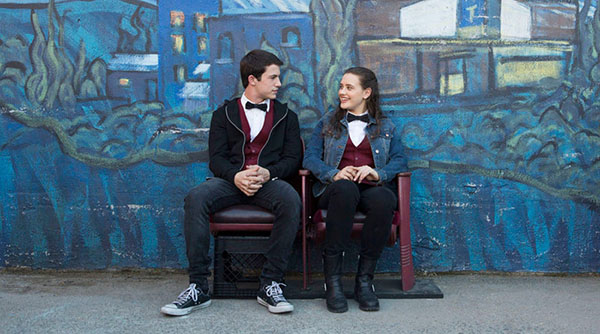Thirteen Reasons Why disappoints, strays from novel

Problematic Production: Mourning his friend, Clay Jensen (Dylan Minnette) follows a journey in the form of cassette tapes that document the thirteen reasons Hannah Baker (Katherine Langford) took her life. Thirteen Reasons Why, originaly based on the novel by Jay Asher, recently aired its first season on Netflix on Mar. 31, 2017.
May 26, 2017
We’re not even halfway through the year and 2017 has already brought forth a lot of disappointments: the Blackhawks’ unfortunate playoff defeat, the Unicorn Frappuccino and Netflix’s new series, Thirteen Reasons Why.
For those who have never read the book, seen the series yet, or have not had a presence on any kind of social media for the past month, Thirteen Reasons Why is the story of Hannah Baker, a high school student who creates 13 cassette tapes, each singling out an individual who led her to make the decision to take her own life. The tapes fall into the hands of her friend, Clay Jensen, and he tries to uncover Hannah’s story and discover what pushed her to end her life.
To say this show was hyped up is an understatement. I was a little late to the party and only started watching it after all my friends had seen it and told me how amazing it was. Thirteen Reasons Why is based on a novel of the same title by Jay Asher, which happened to be one of my favorite books as a middle schooler. So, of course, when I heard Thirteen Reasons Why was turned into a series, I knew I had to watch it. But boy, was I let down.
First, the show deviates from the book in more ways than I can describe, but by far the most noticeable part was the timing. The book is paced quickly as Clay listens to all the tapes in one day, while in the show, he listens to the tapes one at a time, one each day. The show drags and drags for way longer than it should.
Sure, 13 episodes for 13 reasons makes sense, but for viewers, this means nearly 13 hours of listening to a suicide note that ultimately ends with Hannah’s suicide itself, which is built up to as some sort of climax of the series. The way Hannah’s story was depicted in this show did not live up to the 2007 novel.
However, none of this was an acting issue; all the actors portrayed their characters fairly well. Katherine Langford and Dylan Minnette, who played main characters Hannah and Clay respectively, handled their roles appropriately and gave a more than adequate performance. Kate Walsh, who portrayed Mrs. Baker, was especially impressive, giving an exceptional performance of a mother in an unimaginable situation. But again, it wasn’t the acting that disappointed me — it was nearly everything else.
Overall, the way the show depicted the issue at hand was just wrong. Hannah’s suicide was treated as a glorified scavenger hunt, a great mystery whose answer would finally be revealed at the end.
Straying away so far from the book is really where the show went wrong. In the book, the violent scenes were not nearly as graphically described as they were shown in the series. In the book, it was briefly mentioned that Hannah swallowed pills to end her life, while the way Hannah dies in the series is not only a dramatized version of the book but also far from accurate. Towards the end of the show, another student (who happened to be one of Hannah’s “friends” mentioned on the tapes) attempts suicide, which is never brought up in the book.
By wandering so far from the book, Thirteen Reasons Why turned into a violent, graphic depiction of a very real issue. Although the producers and directors explained that the extreme dramatization was meant to educate viewers and show them that even small actions can have a big impact on someone, I am still not convinced that this was the right direction for the show to take. They throw traumatizing events at their audience and defend that by saying it is healthier for them to see it in this harsh, explicit way.
Thirteen Reasons Why was a poor attempt at addressing a very difficult topic, and seemed like it was created for shock value more than anything else. And while I didn’t think the glorification of very serious events could get much worse, Netflix announced that a second season will be released in 2018. People always say that a movie or TV show never compares to the book, but I had never been as disappointed with a TV remake as I was with Thirteen Reasons Why.


